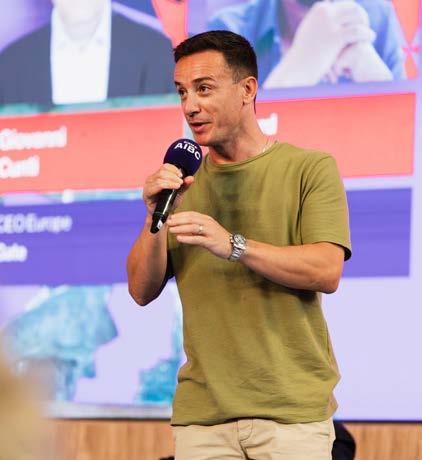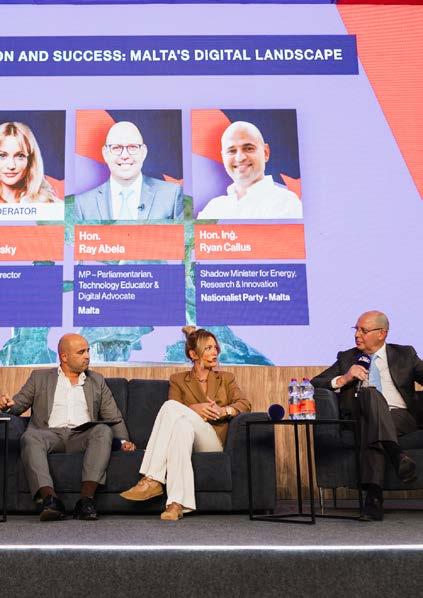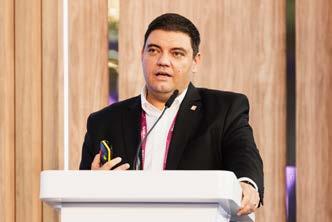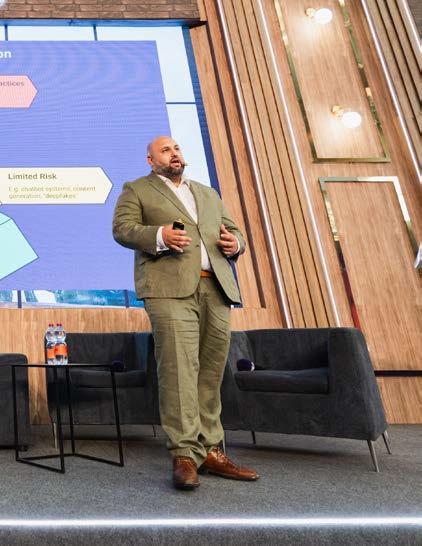Pioneering the Future of Tech & Gaming
Horizon Report 3-6 Sep, 2025

Dr Jane Thomason Emeritus Chair, WorldMetaverse Council, and AIBC Ambassador

Horizon Report 3-6 Sep, 2025

Dr Jane Thomason Emeritus Chair, WorldMetaverse Council, and AIBC Ambassador
Welcome to the SiGMA AIBC “Horizons” series, which distills the emerging insights on tech and gaming that can only be gained from cutting-edge conferences. From AI to regulation, to governance, this report explores vital challenges facing the digital assets and gaming ecosystem, based on the carefully curated panel conversations at SiGMA AIBC events. Each “Horizons” report has a flavour of the region where the event is held.
This issue is based on the SiGMA Euro-Med Malta event, held from 3–6 September, which brought together global leaders across gaming, technology, and digital finance to explore the future of an industry undergoing rapid transformation. Over several days of panels, keynotes, and startup showcases, the event provided a comprehensive view of how emerging technologies, regulatory developments, and human factors are reshaping both the gaming ecosystem and Malta’s role as a hub for innovation. The program covered a broad spectrum of themes, from evolving regulatory frameworks and governance standards to the disruptive impact of AI on gaming, cybersecurity, and creative industries.
It examined the future of sports betting in the era of short-form content, the role of women and inclusive policies in shaping industry culture, and the growing emphasis on responsible gambling and mental health. Finance and payments featured prominently, with stablecoins, CBDCs, and new fintech models debated as the foundations of tomorrow’s digital economy. At the same time, Malta’s “Vision 2030” and “Vision 2050” strategies signalled an ambition to extend beyond iGaming into a broader leadership role in diplomacy, investment, and sustainable innovation.
Regulation was a central theme, with Malta’s role as a global hub challenged by new markets. Discussions stressed the need for harmonized EU rules, ethical governance, and agile regulatory models. The UAE’s careful, phased approach was highlighted as a benchmark for culturally sensitive regulation, while blanket bans in Italy and Spain were criticized as ineffective.
Panels underscored that governance is no longer just compliance; it is a cornerstone of trust and sustainability. New EU anti–money laundering regulations place personal accountability on boards, making proactive oversight and ethical business practices a strategic necessity.
Artificial intelligence was framed as both a transformative force and a potential threat. Sessions explored AI-driven personalization, operational efficiency, and content creation, but also warned of risks such as deepfakes, manipulation, job displacement, and AI-enabled cyberattacks.
Betting is being reshaped by the “TikTok generation,” with shorter attention spans driving demand for gamification, micro-betting, and real-time engagement. Companies are innovating with AI-driven platforms and fast-turnaround wagering to meet this shift.
There was a strong emphasis on responsible gambling, player protection, and harm reduction. Stakeholders called for authentic messaging, cross-border collaboration, and embedding ethics into marketing and product design rather than relying on superficial compliance.
Panels acknowledged the hidden costs of burnout in the fastpaced iGaming industry. Mental health, flexible work policies, and mentorship were flagged as critical for sustaining leadership, empowering women, and building inclusive cultures.
Authenticity and cultural alignment were highlighted as essential to winning customer trust. Affiliates are evolving into brand partners, while companies were warned against copycat marketing and urged to invest in quality content and data-driven strategies.
Stablecoins were presented as a foundation for the future of finance, with the potential to transform cross-border payments, reduce remittance costs, and enhance inclusion. Yet regulatory clarity, trust, and collaboration with banks remain hurdles to be overcome.
A consistent theme was that no single actor, regulator, operator, or innovator can shape the future alone. Cross-sector partnerships, ecosystem-building, and inclusive policies were identified as key to sustaining growth and ensuring Malta remains competitive globally.
The Malta panels offered a powerful illustration of how small, agile jurisdictions can punch above their weight in shaping global industries. Malta positioned itself as more than an iGaming hub, launching long-term visions to expand into B2C, B2G, diplomacy, and technology. Goals include positively impacting one million lives, building innovation ecosystems, and fostering sustainability and talent retention.
Malta has consistently leveraged its size as an advantage, turning constraints into opportunities through swift regulatory innovation, collaborative governance, and a willingness to experiment. From the early adoption of the Virtual Financial Assets Act to the creation of Europe’s first AI sandbox, Malta demonstrated how small jurisdictions can move faster than larger states bogged down by bureaucracy. This agility enables the piloting of new ideas, provides regulatory clarity, and attracts first-mover companies seeking certainty in emerging areas like blockchain, stablecoins, and AI.
Panellists emphasised that Malta’s achievements are rooted in ecosystem building: fostering close partnerships between regulators, industry, and academia, while investing in local talent to sustain growth.
The country’s “Vision 2030” and “Vision 2050” strategies underline an ambition to evolve beyond its iGaming foundations, positioning Malta as a hub for broader digital innovation, diplomacy, and investment. At the same time, its strategic focus on inclusivity, sustainability, and cross-border collaboration has helped reinforce Malta’s credibility as a trusted jurisdiction.
The Malta experience highlights a wider lesson: smaller nations, with cohesive leadership and forward-thinking regulation, can serve as global testbeds for innovation. By staying nimble, cultivating trust, and building adaptable frameworks, Malta has proven that jurisdictional size is less important than vision and execution. Its story stands as an example of how small states can drive outsized impact in emerging technology landscapes.
The SiGMA Stage brought together industry leaders, regulators, and innovators to explore the future of gaming and technology through a wide-ranging set of panels and keynotes. Across the two days, several recurring themes and issues emerged that will shape both Malta’s role as a global hub and the broader trajectory of the iGaming sector.
A central theme was the evolving regulatory landscape. Malta’s position as a global hub for iGaming is under pressure from new markets, raising the need for agility, higher standards, and a balance between B2B and B2C licensing. Discussions on crossborder enforcement highlighted the complexities of inconsistent EU rulings, particularly in Austria, the Netherlands, and Malta, and reinforced calls for transparency, ethics, and harmonized frameworks. Beyond Europe, the UAE’s careful, culturally sensitive regulatory approach, beginning with land-based casinos and moving toward online, was cited as an emerging benchmark for the Middle East. By contrast, blanket advertising bans in Italy and Spain were seen as ineffective, with panelists urging harmonization and smarter, more collaborative regulatory measures across the EU.

Maurizo Soccodato Founder & CEO Global Labs
Business governance and strategy also featured prominently. Success in mergers and acquisitions was linked to transparency, rigorous preparation, and proactive regulatory engagement. Companies expanding globally were urged to design employee incentive schemes that are compliant across jurisdictions but flexible at the local level. The tightening of EU anti-money laundering regulations was presented as a turning point for governance, with boards now facing greater personal accountability. In this environment, good governance is not only a compliance requirement but also a foundation for building trust and long-term resilience.
Innovation and technology were another primary focus. Several sessions warned of the growing risks of AI-driven cyberattacks, including AI-enabled hacking, deepfake identity theft, and largescale fraud. At the same time, AI was seen as transformative for the sector, raising ethical questions about personalization versus manipulation, job creation versus displacement, and whether current regulatory frameworks, such as GDPR, are fit for purpose.
The future of sports betting was framed through the lens of the TikTok generation, where shorter attention spans, gamification, and micro-betting are reshaping consumer expectations. Startups showcased their creativity in this space, pitching AI-driven betting platforms, content production studios, and tools for harm reduction.
The human dimension ran strongly through the program. The pressures of leadership and the hidden costs of burnout in the fast-paced AI gaming industry were acknowledged, with calls for more holistic organizational support. A dedicated panel on women in gaming emphasized the importance of meritbased equity, flexible work arrangements for all employees, and strong mentorship cultures to dismantle structural barriers. Leadership panels reinforced that passion, ethics, and authentic engagement remain the enduring drivers of success in gaming, even as technologies and markets evolve.
Marketing and growth strategies were also examined in detail. Authenticity and cultural alignment were seen as vital, with panellists urging companies to avoid imitation and instead focus on genuine engagement and strong brand identity.
Affiliates are evolving beyond transactional models to become brand partners, driving content creation and localized influence in high-risk and emerging markets.With search engine optimization and social media strategies in flux, speakers urged a focus on high-quality content, data-driven adaptation, and transparency to navigate rapidly changing digital platforms.
Finally, SiGMA itself used the stage to articulate its long-term vision, signalling an ambition that goes beyond iGaming, with expansion into B2C and B2G, social impact goals such as positively impacting one million lives, and positioning Malta as a hub for technology, diplomacy, and investment. Collaboration, ecosystem-building, and inclusivity were emphasized as cornerstones of Malta’s future, ensuring sustainability, talent retention, and cross-sector growth.
Overall, the SiGMA Stage underscored a sector in transition: one balancing regulatory rigor with innovation, safeguarding integrity with growth, and placing people and ethics at the heart of technological transformation. Malta’s legacy as an iGaming pioneer remains strong, but its future will depend on adaptability, collaboration, and a long-term vision that embraces both business and society.

Kate McCormick CEO, WHPartners UAE
This session focused on the overarching vision and goals of the SiGMA Group, outlining the “Vision 2030” strategy and its broader impact on the gaming industry and beyond. The recurring message is about the group’s desire to expand and change for the future while remembering how they were built. SiGMA is evolving to integrate B2C and B2G activities to provide a complete picture experience. Regulation is essential, and SiGMA is leading these efforts to help guide industries to be more forward and also be able to create long-lasting foundations. Finally, the SiGMA Foundation’s mission to positively impact one million lives by 2030 underscores a shift from purely monetary success to a focus on social responsibility.

The keynote highlighted Malta’s dual role as a hub for AI and gaming, alongside the launch of Vision 2030, underscoring the country’s commitment to global tech. The session provided insights into the vision for Malta’s future, focused on tech, ethical business development, and collaboration in the global economy. The subsequent panel offered a comprehensive look at Malta’s gaming success story, highlighting its journey from a small island nation to a worldwide hub for the iGaming industry. The discussion focused on the key factors that have fueled Malta’s success, as well as the challenges and opportunities that lie ahead. The panelists emphasized that a strong foundation combined with consistent reinvention and adaptability is key to growth. They emphasised the importance of Malta serving as an ecosystem that brings together consultants, leaders, members, tech, and other key components to enhance the core product. They emphasised that there is strength in the mindset to see what to build from a blank slate, with strong values and people. Overall, the panel highlighted that Malta’s success in gaming stems from a unique blend of forward-thinking regulation, an entrepreneurial spirit, and a commitment to education and collaboration.

This session explored Malta’s ambitious “Vision 2050,” focusing on the gaming industry as a driver of economic growth and a foundation for innovation. Panellists emphasised the importance of fostering a supportive environment for both established companies and startups, nurturing local talent, and collaborating across sectors and jurisdictions. Key themes were: Malta’s commitment to supporting a diverse ecosystem is a strategic initiative for fostering innovation, retaining talent, and positioning the island as a long-term player in the global digital economy; Malta’s focus on creating a long-term vision to ensure equal opportunity for the residents; and finally the session showcased Malta’s commitment to fostering a dynamic and sustainable ecosystem for the gaming and technology sectors, underscoring the value of collaboration, strategic planning, and a long-term vision that benefits both the industry and the wider community.

This session focused on the future of Malta’s iGaming industry, its regulatory environment, and the shifting dynamics of a global market. The panellists examined key trends, challenges, and opportunities for Malta to maintain its position as a leading hub. Key themes included the shift toward B2B licensing dominance, which has prompted discussions about regulator efficiency in the licensing process and the need for standardized licensing tools. With new markets opening and raising standards to similar heights to Malta, existing industry members seek the secret to long-term success and growth for the sector. Industry leaders suggest that to maintain a competitive advantage, Malta must be adaptable. In conclusion, the panel emphasized that Malta’s

This panel provided an in-depth update on the complex and evolving landscape of enforcing judgments against iGaming operators, particularly focusing on player claims within Malta, Austria, and the Netherlands. The discussion highlighted the increasing complexity and fragmentation of gaming regulation, with the rise of unregulated markets, creative litigation tactics, and differing interpretations of EU law. For example, the Maltese courts’ refusal to enforce Austrian judgments due to breaches of public policy has led to a slowdown in enforcement attempts.
The Netherlands are awaiting the Supreme Court Ruling, with all current cases on hold. There is a question whether claims of abuse of law from GDPR can be used to change the way people access their data. The regulators need to push for a more ethical sector where laws are created, but at the same time, they have the resources and means to be able to follow and uphold those laws. Overall, the session highlighted the ongoing uncertainties in iGaming regulation, the need for a proactive approach and the importance of transparency and ethics. As the legal landscape continues to evolve, operators and regulators must strive to balance compliance with innovation and player protection.

This session illuminated the rapidly evolving gaming regulatory landscape in the UAE, examining its potential as a major player in the global market. The discussion focused on the interplay between tradition, innovation, and economic ambition within the region. The UAE, with Dubai leading, is emerging as a pioneer for the Middle East, paving the way for a more open and regulated gaming environment. Its strategic location, robust infrastructure, and tourism focus position it as a hub for both business and leisure. The government is taking a careful, measured approach, starting with land-based casinos in specific zones like Marjan Island, and later expanding into online gaming while always being sensitive to cultural values, which allows the market to develop sustainably and responsibly. Overall, the session emphasized that the UAE is becoming a more attractive jurisdiction for gaming investment, driven by its economic vision, infrastructure, and a measured approach to regulatory openness. Its future growth hinges on balancing economic opportunities with cultural sensitivities and

This session provided a crucial examination of navigating the complex tax landscape surrounding employee incentives in a globally expanding business environment. The discussion emphasised the importance of designing incentive plans that are both attractive to employees and compliant with varying international tax regulations. Understanding who is defined as an employee or consultant is essential, and this is where attorneys, HR professionals, and financial advisors are needed. This session underlined the need for a multi-faceted, proactive approach to employee incentives, with tax and legal considerations integrated early in the design phase to ensure both attraction of top talent and sustainable compliance for the company.

This panel provided key insights into the navigation and regulatory challenges, as well as the success factors required for Mergers and Acquisitions. Panellists advocated for thorough preparation, including having all documentation in order, and maintaining open communication with regulators as a crucial first step. The regulator must be viewed as a partner and not a person or business to work against. Where multiple jurisdictions are involved, due diligence of the local legal landscapes of the area will lead to a successful transaction. Due diligence, in general, is essential to help speed up all aspects. The session provided a comprehensive overview of the critical elements needed for a successful navigation of mergers and acquisitions.

This panel offered raw and unfiltered perspectives from seasoned industry leaders. The discussion went beyond surface-level advice, delving into the personal drivers, challenges, and philosophies that shape successful brands and teams. Highlights included the enduring power of passion and people. There was an emphasis on instilling a strong sense of worth and ethics within companies and teams, as well as fostering leadership and vision. Leaders were involved in the product, often as the newest team member, which helped bring everyone together. The panel served as a candid reminder that, beyond financial metrics, the gaming industry is built on passion, strong relationships, shared vision, and ethical principles. As the industry evolves, these human elements will continue to be the driving force behind success.
Simon Westbury, Strategic Advisor, 1xBet

This panel offered a deep dive into effective marketing strategies in the gaming industry, emphasising the balance between brand identity, market trends, and authentic engagement with target audiences. It also touched on common pitfalls and ways to achieve impactful results. A key trend is authenticity; there’s no need to have copy-cat designs, as what works for someone may not work for others. Understanding the audience and their interests is crucial for capturing their attention through marketing that aligns with their interests. This included avoiding “Me-too” marketing, which tries to copy or follow a pattern just because it works for another brand or product. Each product needs its own unique identity and should not be a follow-up. Preserving core brand values and identity is non-negotiable. The best marketing strategies resonate with local cultures and norms while staying true to the brand’s unique selling proposition. Ultimately, the session underscored that successful marketing hinges on a deep understanding of the audience, a commitment to authentic engagement, and a willingness to adapt to ever-changing market dynamics while staying grounded in core values.
This panel dissected advertising restrictions in the gaming industry, specifically focusing on Italy and Spain. The conversation explored the effectiveness of these restrictions, unintended consequences, and potential ways forward.
Italy was viewed as a partial success: While initially intended to curb gambling and protect consumers, the blanket advertising ban has been deemed a failure by many, with increases in illegal activity involving minors. The panel noted tangible relaxation of enforcement, such as allowing advertisement when in conjunction with gaming.
Spain was also seen as a partial success. There’s concern that the regulator could reimpose restrictions through other legal avenues (such as public health or customer service laws), with the media showing support. To protect licensed operators, it is essential to inform them of their responsibilities and those who are violating the laws. This means creating a sense of security with all operators. Finally, the goal should be to promote a healthy, competitive market with secure opportunities.
Overall key takeaways were that advertising bans had mixed results, and panellists recognised the need for consistent, harmonized regulatory standards to prevent the growth of underhanded and illegal gaming sites. A key suggestion was to focus on existing regulations and upskilling, empowering people to understand them. There’s growing recognition that a total ban is not the most effective way to promote responsible gaming or consumer protection. The session called for ongoing collaboration and fresh measures to ensure an accountable advertising ecosystem. The call was to work together, test and learn, and adapt those frameworks for the future.
This session brought together experts to discuss the global fight against manipulation and harm in sports betting, a theme increasingly relevant as the industry expands and new technologies emerge. While viewpoints diverged, the panellists underscored a strong shared commitment to safeguarding vulnerable individuals and upholding ethical standards. Building a strong, trustworthy team is extremely important. From the team comes the values needed to succeed, creating an identity of what it is and what it is meant to be. These values and ethics must be strongly built into the lives of those individuals. To offer the best and most ethical products to the market, it is essential to provide key support and offer products that are both beneficial and helpful to the industry. The focus should be on this key area, not all side issues.
The session underscored the ongoing need to address

This panel focused on the vital role of integrity, fairness, and ethical practices in sports and gaming, especially as these intersect with the rapidly evolving world of technology. The panel also touched on jurisdiction and the lack of harmonized rules and standards in the market. There are also key areas of enforcement, like an athlete accepting a fix but coming from another country. Many jurisdictions are not up to date on the gaming industry. Global collaboration is essential. Overall, the session underscored the ongoing need to address vulnerabilities and build trust in the gambling industry, especially across different countries with different laws. This must be improved for a safer sector.
This session explored the critical topic of well-being in the fastpaced and demanding AI gaming industry. The panel touched on points that focused on supporting individuals, establishing open communication channels, and recognising the unique pressures that leaders face. Organisations and managers must cultivate environments that promote open communication, set boundaries, and normalise seeking support. Setting high performance standards is pressure, but it is essential to manage it ethically. Overall, the panel emphasised that prioritizing wellbeing in the AI gaming industry requires a shift towards a holistic approach, balancing organizational goals with individual needs and creating a supportive, inclusive work environment.

Marvin Cuschieri, Group Chief People and Talent Officer at Logifuture, Tatiana Bogolyubskaya, Head of PR at Aviatrix, Anneli Nilsson, Founder at JobMatching Partner, Jaime Debono, CEO iGaming Academy and Abigail Richard, Global Head of Recruitment at CMC Consulting, and Luke Todd, CEO, Executive Coach and Trainer from MadeYou.
This panel focused on the ongoing challenges and potential solutions for achieving greater gender equity and inclusivity within the AI gaming industry. The conversation highlighted the underrepresentation of women in leadership positions, but also cultural biases and structural barriers that can hinder their progress. Panellists underscored the importance of establishing systems and policies that eliminate bias and create equal opportunities. This is essential to prevent people from being put in a position to make decisions based on diversity, instead of hiring based on merit. Flexible work policies are necessary for all employees to achieve a healthy work-life balance, ultimately fostering better performance and commitment. In summary, the session called for proactive measures to address gender inequality, emphasizing genuine commitment, inclusive policies, and a focus on empowerment for women to achieve their full potential within the AI gaming sector.

Margherita Pavoni, Senior Compliance Counsel & Deputy MLRO at EveryMatrix, Valentina Synenka, Board Member at Symphony Solutions, Christine Burlingham, Affiliate Manager at MediaTroopers, Jillian Dingwall,Senior News Writer at SiGMA Group, and Julia Weygandt, Director. Zelda Global.
This panel focused on the evolving cybersecurity landscape and how gaming operators can proactively address emerging threats while building trust and resilience. The panellists discussed the novel ways that malicious actors can weaponise AI. For example, the potential for AI to mimic hacking behaviour was emphasised, suggesting that AI could be used to automate and scale attacks by replicating successful hacking strategies across multiple targets simultaneously. This could involve creating AI agents that probe systems, identify vulnerabilities, and deploy tailored exploits. The advancement of deepfake technologies can enable fraud at scale. There are evolving and new threats, with AI tools increasing the danger for hackers in terms of power, thereby increasing the chances of attacks. The key takeaway was that cybersecurity must be implemented across organisations and that they must continually monitor for new waves of cyberattacks.

This session explored the future of sports betting, focusing on the rapidly evolving user experience and product innovations driven by the rise of esports and changing consumer behaviours, particularly in the TikTok generation. The panel highlighted a shift in betting habits driven by platforms like TikTok, as well as the rapid pace of content consumption. If you do not understand this, then you will not win at all. It means the need for “In-the-Moment” betting with a quick turnaround, the key is quick, easy, and understandable. Speed is of the essence; to capture and retain people’s attention, you need to do so as soon as the app starts. In gamification and Micro-Betting, the way of the future is to give users a quick way to place a bet. Ultimately, the panel emphasized the importance of understanding the nuances of the new generation of users.

Moritz Maurer, CEO at Grid, and Jillian Dingwall, Senior Reporter, SiGMA Group.
This panel addressed the ethical and regulatory challenges that arise as AI becomes more deeply integrated into the iGaming industry. Ethical challenges include: Personalization vs. Manipulation. Balancing the person’s needs and ensuring they are not taken advantage of, especially those who are easily manipulated, is crucial. It is also essential to ask: Is the legal and regulatory framework ready and sustainable to safeguard the use of these devices?The discussion made a shift in perspective, where the next question is “Can we look at what to do to be proactive, to test, to have solutions to protect the user and be ethical about this business”.

Panellists defined high-risk or “emerging” markets not just by economic status, but by regulatory uncertainty, political instability, and cultural sensitivities, citing examples like South Africa, Brazil, the UAE, New Zealand, and even specific U.S. states. The small details are what provide the best outcome. Preparation is key, and knowledge of regulations and the correct audiences is vital. The Panel saw that the key to dominating high-risk and high-reward markets is research.

Klyne, Agency Director for Affiverse.
This panel focused on the affiliate marketing world, concentrating on several aspects that have helped fuel its growth and trends for the future. The panel highlighted that Affiliates need to be dynamic and explore the AI gaming landscape. Content creation is the key and is always required in a world that is evolving. The takeaway is the focus on what an affiliate needs and building collaboration.
This session delivered a high-energy keynote focused on navigating the ever-changing landscape of social media traffic, particularly on platforms like Facebook, for the AI gaming industry. Yaroslav Babich emphasized the importance of adapting to rapidly evolving market dynamics. He highlighted that affiliates are becoming brands with their own social and creative media, and with the help of AI, they need to be transparent with their sources. The keynote highlighted the need for affiliates and operators alike to embrace rapid adaptation, transparency, and data-driven insights to navigate the ever-shifting landscape of social media traffic in AI gaming. It’s about being dynamic, innovative, and constantly refining your approach to stay ahead in the game.

This keynote, presented by Julia Logan, provided a practical and insightful perspective on search engine optimization (SEO) within the iGaming industry, urging attendees to think beyond surfacelevel metrics and strategies. She advised, look at the current picture and identify the changes or key factors that are happening.
The number of linking domains doesn’t guarantee top rankings; it’s more complex and multifaceted than just the numbers, so focus on creating the best data and quality information. The primary takeaway was to adopt a more strategic, critical, and realistic approach to SEO practices, investing in highquality, relevant content rather than cheap hacks.
This keynote highlighted the increasing emphasis on corporate governance and personal responsibility in the gaming industry, particularly in relation to anti-money laundering (AML) compliance. The address stressed that good governance is not just a matter of regulatory adherence but a vital asset that enhances trust, reputation, and long-term sustainability. Good Governance will help lead that effort and will also ensure everything aligns with the new AML legislation. With the rise of new regulations, it’s more critical that companies get their business in shape and ensure compliance with new rules. The keynote emphasized that in the shifting regulatory landscape, prioritizing governance and compliance is not just about following rules, but is about building a foundation for trustworthiness and long-term stability.

The session emphasized that while compliance is a complex and costly challenge, especially for those within the legal framework, it makes a difference when implemented. This panel focused on the importance of compliance management within the AI gaming industry, the challenges of keeping up with evolving regulations, and how best to approach this dynamic landscape. They emphasised the importance of being organised and ensuring everything is in alignment and on top of your business, as well as the ethical and legal ramifications of any decisions.

This concluding panel emphasized the vital relationship between regulatory frameworks, industry innovation, and consumer protection in the AI gaming sector. The overarching goal is to create a safe yet dynamic iGaming environment that fosters both business growth and responsible practices.
Key insights included :
\ Collaboration and Communication: As the business landscape grows, these must also increase.
\ Ethical Innovation: To maximise the benefits of the ethical framework, it is essential to identify the most suitable tools for public and user access.
\ Global Coordination is Key: In all countries, coordination is necessary.
The AIBC stage at Malta 2025 offered a panoramic view of the rapidly converging worlds of gaming, technology, and finance. Over two days, keynotes, panels, and a startup pitch competition illuminated both the opportunities and challenges facing stakeholders in this dynamic landscape.
A World Underpinned by Gaming and AI: A powerful vision emerged of gaming as a core infrastructure of our future, not merely a source of entertainment. Speakers emphasized the convergence of gaming with AI, blockchain, and immersive technologies, forecasting that these immersive ecosystems will eventually create new ways to connect and collaborate. This shift demands that developers move beyond traditional game design.
AI: Balancing Power and Responsibility: Artificial intelligence was a central theme, lauded as a powerful tool for innovation and automation, but also recognized for its potential risks. In essence, the audience requires education and safety as a foundation to develop a plan for success, encompassing both product creation and future marketing strategies.

Stablecoins: The transformative potential of stablecoins was another prominent thread. The discussions underscored how the stability and interoperability offered by stablecoins can enhance financial inclusion, transform payments, and facilitate the development of more integrated ecosystems across traditional and decentralized finance.
New Frontiers in Funding and Development. Innovative insights around financing, mentorship, and brand relationships were key. With many different types of platforms or structures needed for the new technology, the main takeaways are to develop the plan, use data, and develop a brand.
Europe: MiCA loomed large throughout the discussions, with speakers highlighting its challenges and opportunities. As Europe navigates the complex task of regulating digital assets, the tension between fostering innovation and safeguarding consumers and financial stability is evident. The evolving role of AI, coupled with the drive toward sustainable engineering, is crucial for the EU. This is particularly the case when balancing financial stability in an ever-changing environment.
Malta’s strategic position as a pioneering hub for digital innovation resonated throughout the event. Throughout the day, Malta’s ambition to remain at the forefront of digital innovation was palpable. The country’s strategic small size was repeatedly cited as an advantage, allowing for the swift implementation and piloting of new initiatives. Malta continues to strive to be a pioneering hub for digital solutions.
1. Early Adoption of Virtual Financial Assets Act (VFAA): The reference to Malta as the “capital of crypto” and the MFSA’s granting of early VFA licenses underscores the significance of the VFAA. It established a regulatory framework for blockchain and crypto assets, attracting companies by providing legal certainty in a previously unregulated space. This early mover advantage made Malta a hub for crypto exchanges, custody providers, and other VASP businesses.
2. AI Sandbox Initiative: Malta, as the first EU country to launch an AI sandbox, demonstrates a forward-thinking approach. This regulatory sandbox provided a controlled environment for companies to test AI solutions, receive guidance from the MDIA, and gain a “mark of trust” - fostering responsible innovation and attracting companies seeking a supportive ecosystem to develop AI technologies.
3. MDIA as Enabler, Not Just Regulator: The emphasis on the MDIA providing resources like office space, high-performance computing, and a guidance-driven sandbox reflects a shift from traditional regulation to a more proactive, supportive approach. This creates an environment where businesses can reduce costs, increase speed, and explore AI-driven business models within a structured framework, thereby lowering barriers to entry.
4. Investment in Infrastructure (Energy and Data):
While specific policies aren’t mentioned, the session highlights Malta’s commitment to investing in infrastructure, such as data centres with power usage effectiveness (PUE) benchmarks and renewable energy. This suggests policies that incentivize green tech adoption, sustainable data management, and energyefficient gaming operations - aligning digital innovation with environmental responsibility.
5. Streamlined Licensing Processes: The panel discussed the EMI licensing process and introduced a simplified one-step approach, facilitating a more agile transition. This provides an efficient framework, which attracts both smaller and larger companies, leading to an innovation hotspot.
The AIBC stage was a dynamic exploration of converging trends, setting the stage for a future where gaming and technology are interwoven across various parts of society. It created a sense of dynamic tension between technological advancements, regulatory oversight, and the need for more collaborative and ethically grounded approaches to shape the future of the industry.

Dave Pulis Co-Founder & Director ZBX Crypto Exchange
This session highlighted Malta’s ambitious vision for its digital future, emphasizing innovation, regulation, and sustainability. Key themes include Malta’s proactive approach to fostering a digital ecosystem through a supportive regulatory framework, education, and public-private partnerships. The panellists underscored Malta’s leadership in emerging sectors such as cryptocurrencies, AI, gaming, and green tech, showcasing how the nation aims to balance technological advancement with environmental responsibility.
There is a strong focus on the importance of agility in regulation to keep pace with rapidly evolving technologies, alongside the necessity of nurturing local talent and attracting foreign expertise to sustain innovation. Malta’s strategic small size is viewed as an advantage, enabling rapid implementation and piloting of initiatives, including sustainable data centre practices and energy-efficient gaming operations.
The session also addressed challenges, notably talent retention, regulatory agility, and the need for increased capital investment. Both speakers stressed the importance of enhancing digital literacy across all generations, promoting responsible AI use, and employing datadriven approaches for energy efficiency. Malta aims to position itself as a pioneering, eco-conscious hub for digital solutions, leveraging public-private collaborations, agile governance, and a forward-thinking mindset to drive economic growth and technological leadership in Europe and beyond.
Hon. Ing. Ryan Callus, Shadow Minister for Energy, Research & Innovation at the Nationalist Party - Malta, Olga Yaroshevsky, Director for AIBC, and Hon. Ray Abela, MPParliamentarian Technology Educator & Digital Advocate - Malta.

This session underscored the dynamic and rapidly evolving landscape of digital finance, highlighting the significance of collaboration, regulation, and innovation. The panellists collectively emphasized that the future belongs to adaptable, compliant, and forward-thinking entities capable of navigating complex regulatory environments while catering to diverse markets, from highly regulated jurisdictions like Europe to emerging markets in Africa and Asia.
A central insight was the importance of collaboration among industry players of different sizes, large organizations with extensive resources and nimble, regional entities with local expertise. This synergy is seen as essential for expanding financial inclusion, especially in developing countries, and for building seamless, integrated financial ecosystems. The “survival of the fittest” theme reflects ongoing industry consolidation, with smaller firms needing to leverage partnerships and niche expertise to compete effectively against global giants.
Regulatory frameworks, especially the PSD2 directive and upcoming ESG2 regulations, are shaping strategies. While regulatory compliance presents challenges, it also offers opportunities for legitimacy, trust-building, and market growth. Companies are increasingly aligning their operations to meet these standards, with some proactively integrating banking and crypto services within unified ecosystems.
Looking ahead, participants forecast a move toward “super apps” that consolidate crypto, banking, payments, and other financial services into single, user-friendly platforms. The next three years are envisioned as a period of rapid growth, technological integration, and economic inclusion—where collaboration and adherence to regulations will be central to success. Ultimately, the industry’s evolution will depend on innovative partnerships, flexible regulation, and a shared vision of accessible, seamless, and compliant digital finance solutions worldwide.

This panel provided a comprehensive overview of the current state, challenges, and prospects of stablecoins in global finance. A core theme was the critical role stablecoins play in transforming payment systems by offering increased stability compared to traditional cryptocurrencies, which are often marred by volatility. Panellists agreed that stablecoins are poised to reshape digital assets and payments, provided regulatory and infrastructural hurdles are effectively addressed.
A key insight was that user adoption hinges on seamless, easy-touse solutions that hide complex technology behind simple interfaces, like using a mobile phone for everyday transactions. Regulators and stablecoin providers must work closely to build this trust, especially as distinct regulatory frameworks like Mika in Europe pose both challenges and opportunities. The recent regulatory movement towards classifying stablecoins under existing payment directives further highlights the need for clarity to enable industry growth.
Industry leaders emphasized that stablecoins are still heavily intertwined with banking infrastructure. Stablecoins could disrupt traditional banks and card systems by providing more efficient, low-cost settlement pathways, especially in crossborder remittances where local currencies are weak or volatile. There is a shift towards integrating stablecoins into existing and future financial systems, with deepening collaboration between traditional banks, fintech companies, and crypto firms to create holistic, multi-layered payment ecosystems.
The discussion also touched on the technological and infrastructural readiness of current payment systems, with consensus that many are not yet fully prepared but are rapidly evolving. The integration of stablecoins could eventually lead to a future where they displace fiat entirely, creating a more unified, global, and efficient payment landscape.
In closing, panellists underscored the importance of regulatory clarity, innovative infrastructure, and user-centric solutions to unlock stablecoins’ full potential and achieve broader financial inclusion. The overarching message was that stability, collaboration, and seamless integration will be the keys to future success in the evolving payments ecosystem driven by stablecoins.

Loretta Joseph’s keynote at the event provided a comprehensive analysis of the evolving landscape of stablecoins, CBDCs, and digital assets, emphasizing their profound potential to reshape the future of finance while highlighting the importance of robust regulation and international cooperation.
Drawing from her extensive experience, Loretta underscored that stablecoins are central to the global digital economy, facilitating cross-border payments, reducing remittance costs, and unlocking capital markets. She emphasized that, with an estimated market cap of $150 billion and over 75% of global crypto transactions conducted via stablecoins, their influence is rapidly expanding. However, she warned that without careful regulation, stablecoins could introduce systemic fragility and undermine financial stability.
A key theme was the necessity for coordinated, principles-based regulation that balances innovation with risk management. Loretta discussed her work in creating a tiered regulatory framework, differentiating between fiat-backed stablecoins, commoditybacked tokens, and virtual asset service provider-issued stablecoins, tailored to different risk profiles and jurisdictions. She highlighted her role in leading legislative efforts across the Commonwealth, promoting harmonization and cross-border interoperability, particularly through the Commonwealth’s adaptable legal model that aligns with global standards.
Echoing the importance of inclusivity, Loretta noted the challenge of bridging diverse financial systems across countries with varying levels of internet connectivity and regulatory maturity. She advocates for “Leave No One Behind” principles, emphasizing that stablecoins can enhance financial access in underserved regions if managed carefully, thereby supporting financial inclusion and economic
development. Loretta also addressed the emerging competition and technological disruptions threatening traditional banking systems, noting that stablecoins are already proving more efficient, faster, and more interoperable than current cross-border payment networks. She warned against regulatory fragmentation, which could lead to arbitrage and instability, and called for greater regulator engagement with industry innovators to craft inclusive, forward-looking policies.
Finally, Loretta emphasized that the future of finance hinges not only on technological advancements but also on building trust through transparency, regulation, and international collaboration. She advocated for a collective approach to establishing resilient, responsible financial systems where stablecoins serve the people, reducing costs, increasing speed, and ensuring stability, rather than fueling speculative risks. Her insights reinforced the idea that stablecoins represent the new frontier of finance, powerful tools for inclusion and efficiency, but demanding careful governance, collaboration, and foresight from all stakeholders to realize their full potential responsibly.

This panel explored the current and future landscape of digital assets, exploring the contentious and transformative roles of stablecoins, CBDCs, and tokenized assets. The discussion was marked by a vibrant exchange of diverse perspectives, emphasizing that the digital asset ecosystem is rapidly evolving with multiple possible winners on the horizon.
A recurring theme was the strategic importance of network effects — the idea that stablecoins, with their inherent open and borderless nature, are poised to dominate the global payment landscape due to their ability to facilitate seamless crossborder transactions. Panellists highlighted that stablecoins’ widespread acceptance and interoperability give them a distinct advantage over CBDCs, which are often driven by government control and domestic policy objectives.
Participants debated the real motivations behind CBDC issuance, with some viewing them as tools for state control and monetary policy, particularly given the potential for government overreach and tracking of transactions. Others acknowledged that CBDCs could serve practical functions like interbank settlement or supporting financial infrastructure, but expressed scepticism about their widespread retail adoption, especially if actual use is limited or tightly regulated.
The discussion also covered the implications of CBDCs for sovereignty, financial inclusion, and systemic stability. While CBDCs hold promise for improving efficiency and reducing costs, their actual influence depends on government intent and regulatory frameworks. Concerns about privacy and control surfaced repeatedly, with some panellists warning
that CBDCs could be used as instruments of surveillance and censorship, raising fundamental questions about trust.
The role of regulation and government trustworthiness was a hot topic. Panellists criticised the lack of transparency in central bank plans, especially in Europe, where some believe there is a strategic push to control rather than empower users. Conversely, the trust in private stablecoins forms the backbone of current financial flows, with many asserting that private issuers like Circle and Tether have built robust systems backed by reserves, fostering confidence among users.
A significant insight was that the trust and network effects of stablecoins make them not only valuable for current use cases, such as cross-border remittances, DeFi liquidity, and tokenised assets, but also essential to the future of a more interconnected, inclusive global economy. The rapid innovation within DeFi, enabled by the open and flexible nature of stablecoins, is expected to accelerate as regulatory clarity improves, fostering more widespread adoption.
Governments, regulators, and industry players are jockeying for position, some driven by control, others by innovation, and the winners will be those who skillfully balance regulatory oversight with fostering technological and financial progress. The consensus was clear: the future of digital assets is dynamic, multi-faceted, and impactful, with stablecoins likely to play a central role in shaping that future.

Professor Alexiei Dingli offered a comprehensive exploration of artificial intelligence, emphasizing that AI is a mature, transformative technology that is already here to stay. His insights underscored the importance of harnessing AI effectively to turn operational challenges into smart, efficient solutions, highlighting that organizations which successfully integrate AI will gain significant competitive advantages.
A key take away was that AI is not a singular entity but a spectrum of technologies with varying levels of complexity and intelligence. Professor Dingli dispelled common misconceptions, stressing that AI is well-understood, transparent in its functioning, and not some mystical or sentient force, although the complexity of models with billions of parameters makes interpretability a significant challenge.
He warned that accurate AI implementation requires careful planning, high-quality data, and strategic project design. Organisations need to evaluate their readiness, consider the tangible benefits, and focus on quick wins that demonstrate clear value.
Professor Dingli advised that AI projects should be driven by well-defined aims, clear benchmarks, and safeguards for failure scenarios. He suggested a pragmatic approach: start with low-hanging fruit and address pain points to build momentum.
Success in AI, he noted, stems from aligning technological opportunities with strategic organizational goals and fostering a culture of continuous experimentation and improvement.
Overall, the session reinforced that AI is an essential, evolving capability for organizations willing to invest wisely, understand the technology deeply, and implement it thoughtfully. Those who do will undoubtedly secure a significant edge in the future digital economy.

This session with Maltese digital artist and AI innovator Zack Ritchie highlighted the transformative potential of AI in the creative industry, particularly in branding, digital art, and content generation. Ritchie emphasized that AI is a potent and mature tool that, when harnessed correctly, can accelerate creativity, reduce costs, and enable rapid experimentation. A core theme was the democratization of content creation. Ritchie demonstrated how accessible AI tools, covering text, images, 3D modelling, and video, allow artists and creators of all backgrounds to generate high-quality, engaging content in a fraction of the time traditionally required. For example, he showcased AI-generated art, NFTs, and creative experiments with characters that can be used for branding, licensing, or cultural storytelling, emphasising how AI can turn cultural heritage into marketable assets. Richie highlighted that AI’s role is primarily that of an enhancer, supporting humans to express their taste, refine their ideas, and produce engaging material faster and cheaper. He stressed the importance of prompts and iterative interactions with AI models, noting that perfection is not the goal; authenticity and relatability matter more. Additionally, he warned about the proliferation of superficial AI content, encouraging users to focus on genuine, vulnerable storytelling over superficial output. The overarching insight from this session was that AI is a vital, accessible co-creator, supporting human ingenuity rather than replacing it, and its future in creative industries hinges on responsible, authentic use.

Zack Richie Co-Founder NFT Club
This dynamic panel offered a compelling glimpse into the rapidly evolving role of AI within the gaming industry, emphasizing that AI has already transitioned from a novel technology to an essential foundation. Speakers sparked lively debate around whether AI is merely a differentiator or an indispensable component of operational success, ultimately tilting toward the view that AI is quickly becoming a standard technology that companies must adopt to stay competitive.
The panel underscored that AI’s true transformative power lies in its ability to enhance operational efficiency, personalize the player experience, and accelerate content creation. From automating back-office processes to hyper-personalized gaming journeys, AI is enabling organizations to optimize engagement and retention while drastically reducing costs. Experts highlighted that data quality and strategic implementation, embedding AI into core business models, are key to unlocking ROI, not just through automation but also through predictive analytics and targeted marketing.
Discussion also examined ethical considerations, especially around responsible gaming and protecting vulnerable players. Experts emphasized that responsible AI implementation in areas like gambling addiction detection and regulation should be driven by regulatory frameworks that ensure transparency, explainability, and human oversight, aligning with emerging EU AI laws.
Looking ahead, panellists forecasted that AI’s influence will expand significantly over the next 18 months. We can expect to see neartotal automation of game design, player management, and even affiliate marketing. AI-driven content creation will become more sophisticated, enabling rapid development and deployment of new gaming assets, which will democratize entry into the industry, leading to increased competition and innovation. Predictions also included a major shift: that a large percentage of existing affiliates may disappear due to automation, leaving a smaller but wealthier cohort of AI-savvy players. Overall, the session painted a vivid picture: AI has already become the bedrock of innovation in gaming, and its rapid evolution promises to reshape business models, player engagement, and regulatory frameworks, making AI not just a competitive advantage but an industry necessity.

This session provided a comprehensive overview of Malta’s approach to regulating and fostering innovation within the digital finance sector, highlighting both achievements and ongoing challenges. Key themes centered around the nation’s strategic position as a pioneering hub for blockchain, crypto, and fintech, coupled with the importance of balanced regulation that supports growth while ensuring safety and integrity.
A core insight was Malta’s proactive stance as a regulator, emphasizing its focus on creating a conducive environment for innovation through initiatives like its sandbox environment, which offers companies the opportunity to test solutions in a controlled setting. The regulator’s openness to industry collaboration aims to align best practices with evolving European directives, including the upcoming EU AI Act and the digital finance package, ensuring Malta remains a credible and attractive jurisdiction. The regulator’s efforts to streamline licensing processes, particularly in response to MiCA and DORA, demonstrate a commitment to balancing compliance with agility.
The role of legal and regulatory interoperability emerged as vital, emphasizing the need to develop policies that accommodate decentralized and permissionless systems without compromising security and trust. Malta’s position as a gateway for global innovation was underscored, with the country’s ecosystem poised to support societal well-being, sustainability, and the responsible deployment of emerging technologies. Overall, the insights underscore Malta’s forward-looking, balanced approach, driving innovation, ensuring regulatory soundness, and fostering an ecosystem where new startups and established players alike can thrive in a rapidly transforming digital economy.

Speaking on the AIBC stage at the Euro-Med conference taking place today at the Mediterranean Maritime Hub (MMH), Mr Gavril Flores, Chief Strategy, Policy and Governance at the Malta Digital Innovation Authority delivered a keynote on the future of trustworthy AI and Malta’s governance approach.
This panel provided valuable insights into the complex and evolving landscape of fintech and crypto regulation within Malta and the broader European context. Key themes focused on the challenges faced by industry players in navigating the transition to the comprehensive MiCA framework, which is still in its early stages of implementation.
Panellists emphasised that, despite the regulatory clarity brought by MiCA, the reality on the ground is more nuanced. The sheer volume of detailed guidelines, the pace of change, and differing interpretations by national authorities create a landscape of uncertainty and operational hurdles for licensees. Companies are working diligently to meet the standards, often facing increased compliance costs, while the regulatory process remains slow and frequently more reactive than proactive. The need for clearer, more predictable enforcement and supervision was repeatedly underscored, as some operators have had to withdraw or scale back certain services due to compliance burdens. The importance of collaboration among regulators and industry stakeholders was also stressed, with an emphasis on the need to shift focus from mere authorization to adequate supervision and enforcement— to prevent regulatory arbitrage and to ensure a level playing field.
The session painted a picture of a transitioning, somewhat turbulent environment, with ongoing reforms aiming to harmonize and modernize the regulatory framework to foster a safer, more transparent, and sustainable fintech ecosystem. The overarching message was the necessity for the regulators to establish more straightforward guidelines and more decisive enforcement, enabling industry players to operate confidently within a safe and predictable legal landscape.

Camille Pepos Head of FinTech Supervision at the Malta Financial Services Authority (MFSA)
This session offered comprehensive insights into the evolving regulatory landscape affecting the crypto, gaming, and financial services industries. Key themes included the increasing enforcement actions by regulators, which highlight a tightening of operational boundaries for companies lacking proper authorization in jurisdictions like France and the Netherlands. This trend underscores the importance of compliance and regulatory due diligence.
A significant discussion centred on the challenges small players face due to heavy regulatory requirements. The need to strengthen governance, compliance teams, and operational infrastructure poses a significant barrier to entry for startups and smaller entities. Smaller firms often lack the resources to meet stringent governance, outsourcing, and operational demands, making it difficult for them to compete with larger players in the market.
Global operators face increased complexity with expanding regulatory regimes across different jurisdictions. Strategies discussed include appointing local compliance officers, conducting thorough research, and developing a comprehensive global regulatory strategy that monitors the customer base, revenue sources, and regulatory changes continuously. This proactive approach helps operators anticipate regulatory shifts and plan accordingly.
The impact of the forthcoming Markets in Crypto Assets (MiCA) regulation and the IBA’s opinion on the intersection of crypto tokens and payment service licenses was also examined. The tight March 2026 deadline for obtaining necessary permits or facing operational restrictions generated concern among industry players, many of whom are in a state of adjustment or even denial about the regulatory changes. This highlights the urgent need for companies to prioritize licensing and compliance planning to avoid disruptions.
The session touched on the importance of robust market abuse prevention mechanisms within crypto markets, emphasizing the necessity of market surveillance systems to sustain investor confidence and ensure fair trading practices. This aligns with the broader aim of enhancing industry reputation and integrity through rigorous anti-fraud and anti-money laundering strategies. In summary, the session reflected a landscape where regulatory compliance is increasingly integral, requiring strategic collaboration, proactive planning, and advanced technological solutions to foster sustainable growth, innovation, and market integrity within the rapidly evolving crypto and gaming sectors.

This session provided a comprehensive overview of the current landscape of AML and anti-fraud practices within the rapidly evolving sectors of cryptocurrency, gaming, and financial services. The discussion emphasized that as these industries continue to grow, they also face increasing sophistication and prevalence of fraud and regulatory scrutiny. Industry leaders highlighted that fraudsters are deploying more advanced techniques, such as deepfake biometrics and blockchain exploitation, which require companies to adopt innovative, tailored detection tools and proactive strategies to stay ahead.
A central theme was the importance of strong governance, with experts stressing that independence within AML and fraud teams is crucial for effective decision-making. Companies must ensure that internal controls and transparent procedures are in place so that compliance doesn’t become just a box-ticking exercise but a true safeguard of operational integrity. The need for knowledgeable, wellresourced compliance teams was underscored, especially given resource constraints and high staff turnover, which pose additional challenges to maintaining robust AML and anti-fraud measures.
Looking ahead, participants agreed that regulatory environments will only become more stringent, compelling organizations to develop flexible, future-proof systems capable of adapting to evolving obligations. Industry collaboration and ongoing dialogue were recommended as means to anticipate and respond to emerging threats. Sharing knowledge within the industry, engaging with regulators, and participating in relevant bodies can significantly enhance a company’s ability to navigate the complex AML landscape.
The session also covered the critical importance of safeguarding customer funds to build trust. As fraud tactics become more sophisticated, companies need to leverage cutting-edge detection tools to identify and mitigate risks like synthetic identities and new attack vectors. Ultimately, the panellists stressed that organizations must adopt a forward-thinking approach, embedding compliance early into product design and maintaining active industry engagement. Proactive planning, continuous learning, and leveraging best practices are key to safeguarding operations and maintaining industry integrity amidst increasing regulatory and cyber threats. This strategic focus will be essential for sustainable growth and trust in the crypto, gaming, and financial sectors.

This session addressed the rapidly evolving landscape of AI, its impact on cybersecurity and data privacy, and the necessity for a balanced approach to regulation. A core theme was the inherent tension between AI’s transformative potential and the significant risks it introduces. Key insights included:
\ Data Vulnerability: Panellists agreed on the need to address data vulnerability from the use of public tools, where users may inadvertently be sharing personal or proprietary information.
\ Awareness and Education: The need to increase awareness and educate individuals and organizations about AI’s security risks was a consistent message. Participants suggested developing clear policies, creating AI steering teams, and implementing cybersecurity awareness training that specifically covers AI threats.
\ Developer Responsibility: AI offers more power for development, where traditional skills should still be maintained and improved and not sacrificed.
\ Importance of Guidelines and Regulation: The discussion advocated for simple commandments and more regulation to ensure that it can be used more responsibly, while still providing the benefits.
\ Ethical Considerations: Some of the panel discussed using these tools to create models or systems to better themselves, while avoiding bad data practices. The panel focused on the importance of education and understanding as an awareness of AI threats.
Ultimately, the session served as a reminder that progress with AI comes with great responsibility. Balancing innovation with user security and ethical consideration is critical for harnessing AI’s potential.

This session centred around the crucial question of whether businesses need to issue their own tokens in today’s evolving digital landscape. The panel highlighted the shift from the 2021-2022 hype, where tokenization was seen as a universal solution, to a more pragmatic approach grounded in utility and real-world application.
The overarching consensus was that a token should only be considered if it provides genuine utility to users. A tokenized ecosystem should offer benefits beyond mere speculation, such as special rebates, discounts, VIP access, and personalized experiences. Panellists mentioned real-world assets or RWA as one of the best use cases for tokens currently, offering real estate, collectables, and other hard assets.
Overall, the session provided a cautionary yet optimistic view of the future of tokens. While the era of blindly tokenizing everything is over, there’s still a place for strategically designed tokens that offer genuine utility and enhance user experiences within well-developed ecosystems. The key takeaway was that a thoughtful, user-centric approach, prioritizing functionality over speculation, is essential for long-term success in the evolving world of digital assets.

This keynote by Dr Jane Thomason painted a visionary picture of the future, highlighting the convergence of gaming, AI, and blockchain to create immersive and intelligent ecosystems that extend far beyond mere entertainment. The presentation emphasized the potential for gaming to become the core infrastructure of a new digital reality. Extended reality, fueled by gaming, will transform education, work, social interactions, and even relationships. This new reality, experienced through interoperable avatars, creates an interconnected digital world. AI will revolutionize game design and player experience, creating hyper-personalised gameplay, intelligent non-player characters, and automated testing/debugging. This leads to faster releases, reduced costs, and enhanced gameplay experiences. Furthermore, AI will enable a shift towards AI and human co-creation.
Dr Thomason warned of the potential for ethical and societal challenges arising from this convergence, and the importance of addressing narrative coherence, player trust, regulation, economic stability, and the skills gap. Also mentioned was making sure that multi-jurisdictional systems can function correctly by re-evaluating current global governance frameworks to support it. A massive skills gap has emerged, and the need to quickly train people to keep up and grow the future sector has resulted in training needing to be available outside the norm of a four-year computer engineering degree. The core message was a call to action: to not just play the game, but to actively shape the future gaming industry into an underpinning infrastructure of all that humans do.

Dr Jane Thomason
World Metaverse Council
This session distilled practical wisdom on securing funding and developing successful products, particularly within the dynamic tech and gaming spaces. Panellists shared their experiences as investors and entrepreneurs, offering actionable insights and cautionary tales. The discussion focused on creating a culture and work model for success and long-term, versus the overnight hype which is difficult to follow. As the world of business is always an uphill battle and at times can be overwhelming, the importance and power of what partnerships and mentors can provide is immeasurable. This will be used as a key way for companies in the future to gain insight, experience, and connections in certain areas. Overall, this session served as a pragmatic reminder that success in funding and product development requires a blend of strategic foresight, authentic collaboration, and a focus on tangible value creation.

This keynote, framed as both a workshop and therapy session, offered a down-to-earth perspective on entrepreneurship and investment. Speaker Nick Lowenstein emphasized practical, fundamental business principles, illustrated through personal anecdotes and relatable examples. The central question, “Would you invest in you?” served as a powerful tool for evaluating one’s business and personal endeavours. The speaker emphasized looking for businesses that are less trendy. He spoke about the power of running something, even if seemingly basic, for high profits with high levels of low or even non-existence. He encouraged individuals to learn to communicate and connect with people, not just technology. Ultimately, this talk served as a compelling reminder that success often lies in the fundamentals: embracing innovative new technology, focusing on tangible value, and connecting to people with strong and solid values.

Nicholas Levenstein Managing Director of Nicholas Levenstein & Company
This panel focused on the essential elements needed to identify and nurture the next tech unicorns, particularly in the AI and gaming spaces. Discussions underscored a blend of pragmatic business principles and visionary thinking. Speakers cautioned against getting caught up in industry buzzwords and the allure of overnight success. The discussion underscored the need for a sustainable model and long-term vision.
Investors value a deep understanding of what the VCs are looking to provide and what their focus areas are. The ability to pivot and adapt to changing markets, coupled with unwavering belief in a somewhat “crazy” vision, is a hallmark of unicorn founders. This panel offered practical advice on how to identify, build, and invest in unicorn potential, balancing caution with optimism and emphasizing the need for grounded business fundamentals alongside visionary leadership.

Vladimir Malakchi CEO and Managing Partner of Xanada Investments
This keynote, presented by Simon Lowenstein, provided a grounded perspective on investing in AI, focusing on practical applications and team dynamics rather than chasing fleeting hype. The presentation highlighted that simply adopting AI is not a guaranteed path to success. The core argument was that a company’s success is less about the AI it employs and more about the quality of the team using it, its culture, its clarity of purpose, and its ability to adapt and innovate. In fact, implementing AI without these solid foundations can create far more problems. The speaker urged leaders to be themselves and have strong values, rather than focusing on what can be seen as the ‘next’ best thing. Be sure to work the values that set the company apart and stick with those. In essence, the session emphasized that investing in AI is ultimately an investment in people, culture, and the ability to effectively integrate new technologies for tangible business outcomes. It promoted a balanced, mindful approach to AI adoption, grounded in sound business principles and a clear understanding of one’s team.

Courtesy of
Attending an AIBC SiGMA Event is the ultimate opportunity for anyone passionate about gaming, technology, and the future of innovation. In today’s fast-paced world, staying ahead of the curve is essential, and there’s no better way to immerse yourself in cutting-edge developments than by joining the brightest minds in the industry at an AIBC SiGMA event. These events bring together global leaders, entrepreneurs, regulators, and visionaries from across the gaming, technology, and blockchain sectors to discuss, debate, and showcase the most impactful trends and innovations shaping the future. Whether you’re an investor, developer, or enthusiast, the insights you’ll gain from this experience are unparalleled.
At AIBC SiGMA, you are in the front row of game-changing presentations, panels, and keynote speeches that will give you exclusive access to the most current trends in gaming and technology. From the evolution of AI and blockchain to the rise of the metaverse and decentralised finance (DeFi), you’ll hear from thought leaders who are defining the next wave of digital transformation. These events aren’t just about what’s happening now but about what’s coming next.
The AIBC SiGMA event attracts an elite group of industry professionals—entrepreneurs, innovators, investors, and regulators—creating the perfect environment for high-level networking. Building meaningful relationships with industry leaders can unlock new opportunities, partnerships, and collaborations. Whether you’re looking for a mentor, funding for your next project, or simply a way to expand your professional network, AIBC SiGMA offers unmatched access to the key players in the world of gaming and technology.
What sets AIBC SiGMA apart is its immersive, hands-on experience. You will have the opportunity to interact directly with exhibitors showcasing the latest gaming technologies, blockchain solutions, AI-powered tools, and more. Explore interactive demos, participate in live discussions, and witness firsthand the technologies revolutionising industries. This level of immersion ensures that you understand the trends and can experience them in action.
From AI and machine learning to augmented and virtual reality, blockchain, and beyond, AIBC SiGMA delves into the technologies that are changing the way we live, work, and play. Learn how AI is revolutionising gaming experiences, how blockchain is ensuring transparency and security, and how emerging technologies are reshaping user engagement and digital economies. Whether it’s discussing the future of esports, the integration of blockchain in gaming, or the rise of NFT-based gaming assets, the AIBC SiGMA event brings these trends into sharp focus.
At AIBC SiGMA, you’ll have access to a range of expertly curated panels and discussions led by some of the most prominent thought leaders in the world of gaming and technology. These sessions are designed to tackle the big questions, dive deep into emerging technologies, and offer diverse perspectives on the future of gaming, AI, and blockchain. Whether you’re looking to understand the implications of new regulatory frameworks, explore the rise of NFTs, or uncover the latest trends in game development, you’ll leave with a wealth of knowledge that can directly impact your work.
In conclusion, AIBC SiGMA Events are the premier destination for anyone looking to stay at the forefront of the gaming and technology industries. It’s more than just an event—it’s an experience that will deepen your understanding, broaden your network, and provide you with the tools to succeed in an increasingly digital world. Don’t miss the chance to gain unparalleled insights into the innovations that will define tomorrow.
We hope you enjoy SiGMA AIBC Horizons: Pioneering the Future of Tech & Gaming. ASIA 2025

Jarek Bialek CEO Revenue Capital